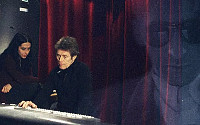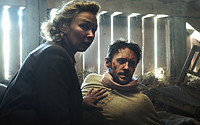| SHADOWS ON THE WALL | REVIEWS | NEWS | FESTIVAL | AWARDS | Q&A | ABOUT | TALKBACK | ||||
 Shadows off the beaten path Shadows off the beaten path | ||||
| Indies, foreigns, docs, revivals and shorts... | ||||
|
On this page:
MY BEST FRIEND |
PADRE SCAFFOLDING | THE 12TH MAN < < F O R E I G N > > last update 2.Jan.19 See also: SHADOWS FILM FESTIVAL | ||||
| R E V I E W B Y R I C H C L I N E | ||||
My Best Friend Mi Mejor Amigo Mi Mejor Amigo
| ||||
|
dir-scr Martin Deus prd Pablo Ingercher Casas, Daniel Pensa, Miguel Angel Rocca with Angelo Mutti Spinetta, Lautaro Rodriguez, Moro Anghileri, Guillermo Pfening, Benicio Mutti Spinetta, Romana Aleksandra Gulich, Renata Lizzi, Maite Valero, Irina Misisco, Joaquin Borovich, Elana Murgia, Santiago Manera  release Arg 8.Nov.18, US 27.Nov.18, UK 17.Dec.18 18/Argentina 1h30
|  Relaxed and introspective, this Argentine drama allows its characters to deepen in intriguing ways. A gentle coming-of-age story of a shy teen in Patagonia, the storytelling reflects his introverted personality. Writer-director Martin Deus elicits remarkably naturalistic performances from the entire cast, which sometimes makes us feel like voyeurs. It's also so light-handed that it's left to us to take what resonates with us.
Relaxed and introspective, this Argentine drama allows its characters to deepen in intriguing ways. A gentle coming-of-age story of a shy teen in Patagonia, the storytelling reflects his introverted personality. Writer-director Martin Deus elicits remarkably naturalistic performances from the entire cast, which sometimes makes us feel like voyeurs. It's also so light-handed that it's left to us to take what resonates with us.
Scrawny 16-year-old Lorenzo (Spinetta) and his switched-on parents (Anghileri and Pfening) take in the son of a family friend who needs a home. Caito (Rodriguez) is cool, aloof and one year older than Lorenzo. But underneath his tough exterior, he's just as needy, so they find unexpected common ground. Lorenzo is exploring sex with school girl Graciana (Gulich), but he is finding himself more and more attracted to Caito, who begins to reveal some mysterious secrets about his background. And as they bond, Lorenzo begins to question himself in a way he never imagined. Filmmaker Deus creates an earthy storytelling rhythm that keeps things moving forward even when it seems like not much is happening. Conversations feel unnervingly normal, as characters speak about life outside the frame. When Lorenzo's mother tries to get him to talk about his sexuality, it's predictably excruciating, but also sensitive and telling. The emotions that rise up are unexpected, as Caito relentlessly pushes Lorenzo's buttons, occasionally tipping him over the edge. The actors are solid, underplaying their roles in a way that makes it easy to identify with them. Spinetta and Rodriguez are terrific as young guys who simply need a friend at a difficult time of life. Their dialog is played without melodrama, even as it touches big issues with a variety of clashes and connections. This allows their friendship to grow organically, without forcing it. These are likeable, talented young actors who have terrific presence on-screen and create superb rhythms with each other. Lorenzo can't understand why Caito does everything on impulse, causing pain without understanding why. But he's beginning to understand that his feelings for Caito are much stronger than they should be for a family friend. This isn't an emotion he particularly wants to experience. So the issue of sexuality hovers through almost every scene as Lorenzo grapples with his thoughts and urges. It's never an obvious romance, or even a pointed issue-style drama. Instead, the film remains thoughtful and a bit elusive. And it's very moving. | |||
|
15 themes, language 16.Dec.18
| | |||
| R E V I E W B Y R I C H C L I N E | ||||
Padre

| ||||
|
dir Giada Colagrande prd Gaia Furrer scr Giada Colagrande, Claudio Colombo with Giada Colagrande, Willem Dafoe, Franco Battiato, Marina Abramovic, Claudio Colombo, Carlo Guaitoli, Fabio Balasso, Annalisa Canfora, Gemma Carbone, Alice Colombo, Alessandra Cristiani, Esther Elisha  release It Apr.17 lff, UK Jan.19 16/Italy 1h30 |
 With a creeping giallo style, this Italian dramatic thriller gets into the mind of a woman who is grieving the death of her father. A splash of ghostly freakiness adds to the otherwise slow-churning narrative, which spirals in a mesh of otherworldly imagery, literary quotes and performance art. The film is sometimes difficult to grab hold of, and its central theme isn't terribly deep, but it's mesmerising to watch.
With a creeping giallo style, this Italian dramatic thriller gets into the mind of a woman who is grieving the death of her father. A splash of ghostly freakiness adds to the otherwise slow-churning narrative, which spirals in a mesh of otherworldly imagery, literary quotes and performance art. The film is sometimes difficult to grab hold of, and its central theme isn't terribly deep, but it's mesmerising to watch.
Giulia (Colagrande) has just lost her beloved father Giulio (Battiato), a famous composer. Her mother (Abramovic) missed the funeral because she was travelling from Japan to India at the time, so consoles her daughter by videochat. More present is James (Dafoe), Giulia's good friend and director of a stage show she's working on, which uses music, dance and projection to explore powerfully artistic women. Then in the middle of the night, Giulia hears her father playing the piano, and he continues to appear to her, always just out of reach. The film looks superb, with a terrific series of settings and characters, even if most scenes are overrun with obtuse quotations. Moving almost in slow motion, the film swirls with intriguing visuals, from the spirits that appear in every corner to Guilia's almost outrageously expressive cat, who gives the most engaging performance in the film. Much of what happens is heightened, often downright arch, with hints of a sinister secret society that the ghost of Guilia's father seems to be leading her into. With so much offbeat acting, it's refreshing that there are moments of loose realism here and there. This helps ground the characters in between the more stylised scenes. Colagrande is relaxed and open for much of the film, playing Guilia as someone genuinely seeking answers and trying to get closure after her father's sudden demise. Dafoe (Colagrande's real-life husband) has an easy chemistry with her, even as things begin to feel increasingly bizarre. The film flickers between Guilia trying unsuccessfully to sleep at home alone and the cast rehearsing for their show. In between are languid sequences of moonlit city streets, parties with friends and attempted interaction with her father and other spirits. The soundtrack is a continual stream of quotes from books, speeches and letters, none of which are easy for the audience to decode. But the central theme is announced right at the start, with the observation that Giulio will always be her father, even after death. It's not particularly revelatory, but it is some comfort to Giulia. | |||
|
12 themes, nudity 13.Sep.18 | ||||
| R E V I E W B Y R I C H C L I N E | ||||
Scaffolding
| ||||
|
dir-scr Matan Yair prd Gal Greenspan, Roi Kurland, Stanislaw Dziedzic, Moshe Edery, Leon Edery with Asher Lax, Yaacov Cohen, Ami Smolartchik, Keren Berger, Naama Manor, Hagit Dasberg, Dina Limon, Riki Daskal, Sharona Shir, Yossi Barda, Or Lax, Or Skera  release Isr 9.Nov.17,
release Isr 9.Nov.17, US 28.Sep.18 17/Israel 1h34 
|  Shot and acted with an earthy realism, this Israeli drama quickly grips the audience with a sense of complexity in the relationships between the characters. These people are one thing in public and another on their own. Within this film's loose but pointed approach, the teen protagonist is only beginning to understand this disparity, and it will take some courage for him to become his own man and ask some difficult questions.
Shot and acted with an earthy realism, this Israeli drama quickly grips the audience with a sense of complexity in the relationships between the characters. These people are one thing in public and another on their own. Within this film's loose but pointed approach, the teen protagonist is only beginning to understand this disparity, and it will take some courage for him to become his own man and ask some difficult questions.
At 17, Asher (Lax) has always been a troublemaker. A natural charmer, he struggles to control his temper. And when he crosses his father Milo (Cohen), it's easy to see where he gets it. Milo simply expects Asher to take over his scaffolding business, unaware and unconcerned that Asher has an artistic soul hidden beneath his tough guy exterior. It's Asher's literature teacher Rami (Smolartchik) who breaks through his shell, teaching him that a man can be soft-spoken and sensitive. The question is whether Asher can overcome his thuggish instincts. Without even a hint of sentimentality, Rami encourages Asher to experience life on his own, without the influence of others. It's a simple but profound comment that underscores how filmmaker Yair is confronting mindlessly destructive elements of society. Rami ignites Asher's imagination, urging him to put his phone down and read a newspaper or book instead. By contrast, Milo places no value on education, asking Asher to ditch his exam studies to keep the business running while he has a hospital procedure. Lax has a remarkably expressive physicality, revealing conflicting emotions at every moment. It's easy to see the anger drowning out the sensitivity Asher has been taught to subdue. Watching him grapple with this is fascinating, especially since he has no patience and finds it difficult to focus. But the events around him force him to look inside, and in the end he begins to understand that he's the only one who can decide for his future. This is a provocative deep dive into the cool machismo that's often seen as a virtue but actually forces young men to be someone they aren't. Other characters in the film remain around the edges, interacting with Asher to push him along, although this never feels obvious or preachy. Writer-director Yair's approach is complex and surprising, continually upending the characters and the audience with plot turns that are both microscopic and hugely momentous, using comedy, tragedy and relationships to say something pungent about responsibility and self-respect. | |||
|
15 themes, language, violence 2.Jan.19
| | |||
| R E V I E W B Y R I C H C L I N E | ||||
The 12th Man
 Den 12. Mann Den 12. Mann
| ||||
|
dir Harald Zwart scr Alex Boe prd Aage Aaberge, Veslemoy Ruud Zwart, Espen Horn, Harald Zwart with Thomas Gullestad, Jonathan Rhys Meyers, Mads Sjogard Pettersen, Marie Blokhus, Martin Kiefer, Aggie Peterson, Marius Lien, Tiril Holthe Harnang, Hakon T Nielsen, JI Falck, Mathilde Sofie Henriksen, Julia Bache-Wiig  release Nor 25.Dec.17,
release Nor 25.Dec.17, US 4.May.18, UK 4.Jan.19 17/Norway 2h16 |
 Based on an astonishing true story, this high-octane WWII thriller is skilfully directed by Dutch filmmaker Harald Zwart to play up the cinematic adventure. Since the script never quite taps into present-day relevance, the film's epic length feels rather draggy, but each sequence is informative and involving, with moments of strong suspense as well as some low-key emotional resonance.
Based on an astonishing true story, this high-octane WWII thriller is skilfully directed by Dutch filmmaker Harald Zwart to play up the cinematic adventure. Since the script never quite taps into present-day relevance, the film's epic length feels rather draggy, but each sequence is informative and involving, with moments of strong suspense as well as some low-key emotional resonance.
Three years after the Nazis occupied Norway in 1940, the British trains 12 Norwegian saboteurs in Scotland. Only one of them, Jan (Gullestad), survives the initial skirmish during the icy landing. Injured and on the run, he sets out to make sure their mission was not in vain, helped by locals loyal to the resistance. Meanwhile, the hotheaded Nazi officer Kurt (Meyers) is leading the search for him. But the escape route to neutral Sweden crosses unforgiving terrain, and Jan faces frostbite, hypothermia and gangrene at every turn, with the Germans in hot pursuit. The film's pulsing pace is augmented by the snowy settings, which add a spectacular, chilling backdrop. The Germans' brutal desperation to find this missing man is nicely balanced in Jan's determination to survive. There's a freeform structure to Jan's odyssey as he gets assistance and evades capture, leading to both tense near-misses and some repetitive isolation. And while it adds authenticity, the grisliness is sometimes difficult to stomach. Gullestad is a superbly engaging hero whose open-faced emotion makes him easy to sympathise with. He gives Jan's physical endurance a striking sense of tenacity, whether in a frozen fjord or mountainside avalanche. By contrast, Meyers does what he can as the tunnel-visioned villain, a snarling killer worried that his perfect record will be tarnished if he doesn't catch a fugitive who shouldn't be alive in these conditions. Meanwhile, the supporting actors add memorable touches as people who heroically offer help along Jan's escape route. Each segment of this gruelling journey feels more impossible than the last one, and Zwart maintains a heightened realism that taps into Jan's mental state, surviving against the odds simply because he has to. At every step, the production designers include immersive period details that are realistic enough to help us experience the ordeal ourselves. An opening prolog gives away the fact that Jan survives, but watching his finely depicted ordeal is gripping, and seeing the brave ordinary people he encounters along the way is inspiring.
15 themes, language, violence | 2.Jan.19 

See also: SHADOWS FILM FESTIVAL © 2019 by Rich Cline, Shadows
on the Wall
| ||